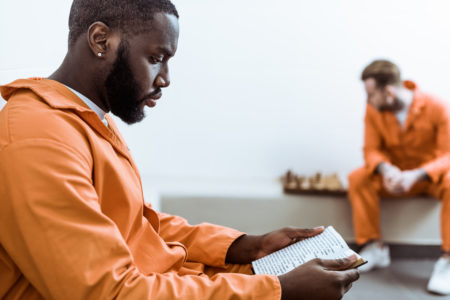By Maureen Smith
JACKSON – Prison ministers for the Diocese of Jackson are taking their work outside the cells thanks to a new initiative meant to help people adjust to life after incarceration. The program is called Getting Ahead While Getting Out and it starts months before an inmate is released. The idea is to help someone gain some life skills and start building a support network before they ever leave prison.
On Saturday, May 19, Marvin Edwards, who coordinates prison ministry for the diocese, and Daughter of Charity Sister Madeline Kavanagh will host a training at Flowood St. Paul Parish for people who want to be facilitators in the Getting Ahead While Getting Out program. Anyone is welcome to attend – including non-Catholics – but the workshop is primarily for people who already have clearance to visit prisons. Everyone needs to register.

Photo courtesy of Bickstock
Edwards and Sister Kavanagh are collaborating on the new program. It is a relationship-based model for reintegration. Facilitators will meet with small groups of inmates in the months before their parole to prepare them for their life after release. “They have a workbook and they answer questions such as ‘how did I get here, what factors contributed to my situation,’ things like that,” said Sister Kavanagh. The participants learn how to manage finances, how to seek a job and how to build a support network. According to the program website, a large percentage of released convicts will get into trouble within days of release. Often, they return to old habits or they simply don’t know how to start a new life.
“There are so many inmates that are there simply because they didn’t know any better. They didn’t have any background – any roots. They are very intelligent. Don’t get me wrong, there are some in prison who don’t need to get out, but the majority of them could change if they had the opportunity,” said Edwards, who has been a prison minister for years in Mississippi. He said the prison system does not offer inmates the opportunity to transform their lives. “Lots of them just messed up. They were teenagers and they end up in prison for 20, 30 years. When they get out, they don’t know what to do,” he added.
This program, said Sister Kavanagh, gets them to start to think critically. “The woman who started it was a real educator. She realized we are always going in and telling people how to live their lives and that doesn’t work. Participants in this program are considered investigators,” explained Sister Kavanagh. “The facilitators don’t tell them what to do, the participant goes through his or her own program,” she said. The inmates take control of their own lives. The program materials refer to the participants as ‘returning citizens’ to help them see themselves in a new way.
“We are looking for people who can listen and accompany these prisoners as they go through the process,” she said. “When they are thinking out loud and being listened to, they find their own power and their own wisdom. They realize they have all this potential,” she added. In addition to facilitators, Sister Kavanaugh said the program will need community partners.
“We hope people realize that the people coming out of prison have not had the advantages that many others have had. They need support. They need people who can be mentors, who can help them get jobs, who will welcome them into the parish,” she said.
The training takes a few months to complete. While facilitators are being trained, Edwards will make contact with the individual prisons to lay the groundwork for the program. He already has support from the prison system. He believes it’s because the program is free for the prisons, and has the potential to save the state money by reducing recidivism. He hopes to have it up and running in February of 2019. Those interested in the training can call Marvin Edwards at (601)594-8254 or Sister Madeline Kavanagh at (213)215-6103.
